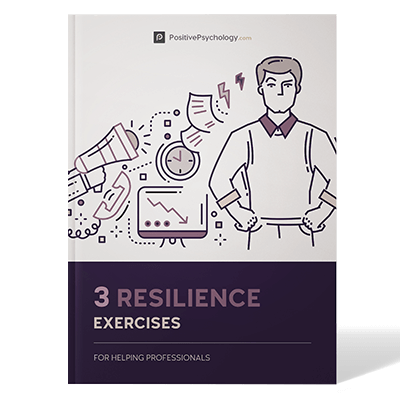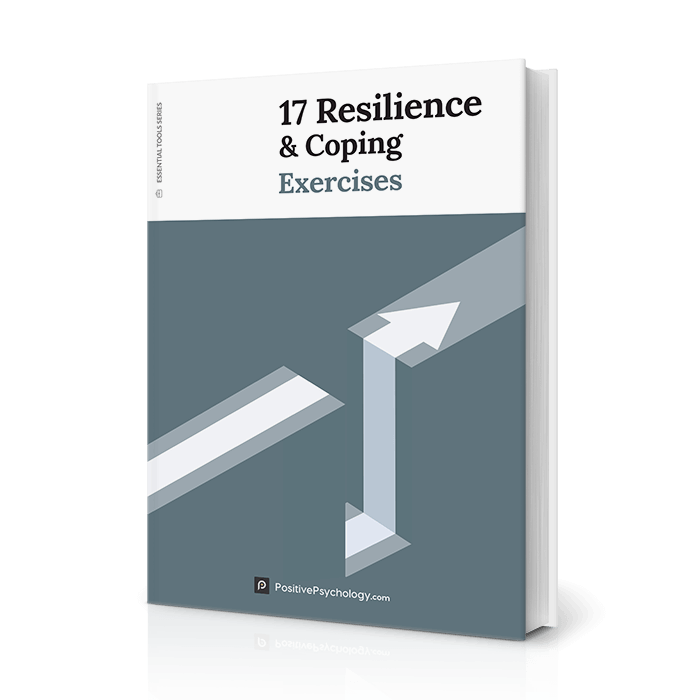The Connor Davidson + Brief Resilience Scales
 The Connor-Davidson Resilience Scale was developed by two researchers — Kathryn M. Conner and Jonathan R.T. Davidson.
The Connor-Davidson Resilience Scale was developed by two researchers — Kathryn M. Conner and Jonathan R.T. Davidson.
Connor is a psychiatrist and a researcher at Duke University Medical Center in Durham, North Carolina. Her research is focused on stress, anxiety, social anxiety, medications, and resilience.
Davidson is a Professor Emeritus of Psychiatry and Behavioral Science at Duke University. His studies focus on PTSD, as well as many other psychiatric topics.
Both Connor and Davidson began developing this scale as a result of working with PTSD patients in their clinical practice.
They did so when they recognized that there weren’t many resilience scales available at the time to support them in treating their patients.
Before you read on, we thought you might like to download our three Resilience Exercises for free. These engaging, science-based exercises will help you to effectively cope with difficult circumstances and give you the tools to improve the resilience of your clients, students, or employees.
This Article Contains:
- What is the Connor-Davidson Resilience Scale? (CD-RISC)
- What Versions are There? (2, 10 & 25 Item)
- How Does Scoring Work?
- A Look at the Reliability and Validity of the CD-RISC
- Where Can I Download the CD-RISC Online?
- What is the Brief-Resilience Scale (BRS)?
- How Does it Assess a Person’s Ability to Cope and Bounce Back?
- Scoring and Interpretation
- A Look at the Reliability and Validity of the BRS
- Where Can I Find the BRS Scale Online?
- A Take-Home Message
- References
What is the Connor-Davidson Resilience Scale? (CD-RISC)
The Connor-Davidson Resilience Scale is a test that measures resilience or how well one is equipped to bounce back after stressful events, tragedy, or trauma.
Resilience gives us the ability to thrive in the face of adversity. Those who are resilient are better able to move through the traumas of life.
The Connor Davidson Resilience Scale measures several components of resilience:
- The ability to adapt to change.
- The ability to deal with what comes along.
- The ability to cope with stress.
- The ability to stay focused and think clearly.
- The ability to not get discouraged in the face of failure.
- The ability to handle unpleasant feelings such as anger, pain or sadness.
What Versions are There? (2, 10 & 25 Item)
The CD-RISC-2, CD-RISC-10, and CD-RISC-25 are the only versions of the scale authorized for use.
There are many unauthorized versions, created without permission and in violation of copyright.
CD-RISC-2
The CD-RISC-2 is a two-item scale forming part of the longer CD-RISC. This short scale is useful as a brief measure of resilience or for measuring progress after treatment. (Vaishnavi, Connor & Davidson (2007).
According to Vaishnavi, Connor, and Davidson (2007), the CD-RISC-2 shows test-retest reliability, adequate internal consistency, convergent validity, as well as divergent validity.
As part of the study done by Vaishnavi, Connor, and Davidson (2007), two items from the original scale were used – noting that the items listed here are not a complete representation of the scale.
- I am able to adapt when changes occur.
- I tend to bounce back after illness, injury, or other hardships.
For more complete instructions for administering the scale; please visit the official CD-RISC website to request and obtain the scale.
The creators of the scale selected these two items as etymologically capturing the true essence of resilience, or the ability to bounce back and successfully adapt to change.
CD-RISC-10
The 10-item scale is comprised of ten of the original 25 items from the CD-RISC-10 scale. A respondent’s total score can range from 0-40.
The following represent items for the 10-item Connor-Davidson Resilience Scale – noting that the items listed here are not a complete representation of the scale:
- I am able to adapt when changes occur.
- I can deal with whatever comes my way.
- I try to see the humorous side of things when I am faced with problems.
- Having to cope with stress can make me stronger.
- I tend to bounce back after illness, injury or other hardships.
- I believe I can achieve my goals, even if there are obstacles.
- Under pressure, I stay focused and think clearly.
- I am not easily discouraged by failure.
- I think of myself as a strong person when dealing with life’s challenges and difficulties.
- I am able to handle unpleasant or painful feelings like sadness, fear, and anger.
For more complete instructions for administering the scale; please visit the official CD-RISC website to request and obtain the scale.
This 10-item scale was developed by Drs. Campbell-Sills and Stein, at the University of California, San Diego, based on factor analysis.
Possible responses range from:
0 – Not true at all.
1 – Rarely true.
2 – Sometimes true.
3 – Often true.
4 – True nearly all the time.
According to Scali et al. (2012), the CD-RISC was initially considered to be multidimensional, with factors comparable to:
- Tenacity and competence.
- Trusting in one’s instincts and tolerating negative affect.
- Accepting of change and secure within relationships.
- Control.
- Spirituality.
However, in subsequent studies utilizing independent samples, some instability was revealed in the factor structure. This led to the recognition of an abridged 10-item version, the CD-RISC-10.
The remaining ten items were thought to be a better reflection of the ability to bounce back from the variety of challenges that can arise in life.
This unidimensional version has equally excellent psychometric properties, and the longer version has been shown to be appropriate for use within different cultures and has been used extensively in epidemiological studies. (Connor & Davidson, 2003; Notario-Pacheco, et al. 2011; Wang, Shi, Zhang, & Zhang, 2010)
CD-RISC-25
The Connor-Davidson Resilience Scale (CD-RISC-25) is a self-administered scale containing 25 items that exhibit good psychometric properties.
The following represent the items for the 25-item Connor-Davidson Resilience Scale – noting that the items listed here are not a complete representation of the scale:
- I am able to adapt when changes occur.
- I have one close and secure relationship.
- Sometimes fate or God helps me.
- I can deal with whatever comes my way.
- Past successes give me confidence.
- I try to see the humorous side of things when I am faced with problems.
- Having to cope with stress can make me stronger.
- I tend to bounce back after illness, injury or other hardships.
- I believe most things happen for a reason.
- I make my best effort, no matter what.
- I believe I can achieve my goals, even if there are obstacles.
- Even when hopeless, I do not give up.
- In times of stress, I know where to find help.
- Under pressure, I stay focused and think clearly.
- I prefer to take the lead in problem-solving.
- I am not easily discouraged by failure.
- I think of myself as a strong person when dealing with life’s challenges and difficulties.
- I make unpopular or difficult decisions.
- I am able to handle unpleasant or painful feelings like sadness, fear, and anger.
- I have to act on a hunch.
- I have a strong sense of purpose in life.
- I feel like I am in control.
- I like challenges.
- I work to attain goals.
- I take pride in my achievements.
For more complete instructions for administering the scale; please visit the official CD-RISC website to request and obtain the scale.
The CD-RISC-25 scale was taken from van der Walt, Suliman, Martin, Lammers, & Seedat (2014).
How Does Scoring Work?
According to Scali et al. (2012), the original 25-item scale was designed to assess resilience, with higher scores being an indicator of high resilience.
Each item is rated on a 5-point scale ranging from not true at all or zero to true nearly all of the time or four.
The total possible scores range from 0–100.
A Look at the Reliability and Validity of the CD-RISC
A study done by Gonzalez, Moore, Newton, and Galli (2015) examined the validity and reliability of the Connor-Davidson Resilience Scale in the context of competitive sport.
The study had three primary goals:
- To examine the structure and fit of the original 25-item CD-RISC as a five-factor scale and a unidimensional scale, as well as the 10-item scale.
- Examine any gender invariances.
- Examine the validity of the best fitting scale.
The ten-item scale was psychometrically superior when compared to the unidimensional 25-item scale as well as the five-factor 25-item scale. This conclusion was derived from confirmatory factor and item-level analyses. (Gonzalez, Moore, Newton & Galli, 2015)
The ten-item scale also exhibited measurement invariance for gender.
Using structural equation modeling, the ten-item scale correlated positively and moderately with positive affect. The scale was inversely related to performance anxiety and negative affect, thereby demonstrating convergent and divergent validity. (Gonzalez, Moore, Newton & Galli, 2015)
In one study measuring resilience in adult women using the 10-item scale, the CD-RISC-10 showed high internal consistency (Scali et al., 2012).
A preliminary study of its psychometric properties in the general population and patient samples showed adequate internal consistency, test-retest reliability, and convergent and divergent validity. (Scali et al., 2012)
Where Can I Download the CD-RISC Online?
To obtain the scales, you must contact the official copyright holders at the official CD-RISC website as the items listed in this article are not a complete representation of the scale and omit the instructions for its administration.
What is the Brief-Resilience Scale (BRS)?
The Brief Resilience Scale differs from other resilience scales because it does not attempt to measure or even identify personal characteristics and social resources that someone may possess or develop to help promote adaptation.
The Brief Resilience Scale was developed purely to assess the concept of resilience under its original etymology or measure of ability. (Brief Resilience Scale (BRS), 2019.)
How Does it Assess a Person’s Ability to Cope and Bounce Back?
The Brief-Resilience Scale intends to measure one’s ability to bounce back or recover from stress. According to Smith et al. (2008), these notions of ‘bouncing back’ and recovering from stress are closest to the original meaning of resilience.
Previous measures have typically assessed things like protective factors or resources that involve personal characteristics and coping styles. The brief resilience scale is designed to measure and evaluate resilience in terms of how quickly one adapts to stress, bounces back, resists illness, and thrives in the face of adversity.
Being able to measure how someone bounces back from stress provides valuable insight when it comes to helping a person cope with health-related stressors (Smith et al., 2008)
Scoring and Interpretation
The Brief Resilience Scale is a 6-item scale that measures responses to the following statements:
- I tend to bounce back quickly after hard times.
- I have a hard time making it through stressful events.
- It does not take me long to recover from a stressful event.
- It is hard for me to snap back when something wrong happens.
- I usually come through difficult times with little trouble.
- I tend to take a long time to get over setbacks in my life.
Scale courtesy of Smith, Dalen, Wiggins, Tooley, Christopher & Bernard, (2008).
Scoring is measured on a 5-point scale, adding the responses on all six statements with possible ranges from 6-30. Item responses range from:
- Strongly disagree.
- Disagree.
- Neutral.
- Agree.
- Strongly agree.
To compute the score, first reverse the scores of items 2, 4, and 6. Reversing a score is done by exchanging the original value of an item by its opposite value: a score of 1 turns into a score of 5, a score of 2 turns into a 4, etc. Then, add up all the individual item scores.
A weighted score can be calculated by dividing the total score by the number of items; in this case, 6 with higher scores would be reflective of greater resilience.
A Look at the Reliability and Validity of the BRS
According to Smith, et al., (2008), the Brief Resilience Scale is a reliable tool for assessing factors of resilience in terms of the ability to recover and bounce back from stress.
The Brief Resilience Scale provides both unique and important information about people and how they cope with health-related stressors.
Where Can I Find the BRS Scale Online?
The Brief Resilience Scale is one of the tools offered via the PositivePsychology.com Toolkit. It is a great way to track progress in terms of resilience and is suitable for administering while conducting therapy or coaching sessions.
You can easily obtain access to the Brief Resilience Scale, by signing up for the PositivePsychology.com Toolkit, which will also provide you access to 400+ tools.
A Take-Home Message
Resilience allows us to thrive in the face of adversity. Resilience is a multidimensional characteristic that changes over time. A person’s resilience may depend on a range of factors, including age, gender, cultural origin, and even context.
Resilience may even vary within an individual as they are subjected to different circumstances in life. (Connor & Davidson, 2003)
As one adapts their body, mind, and spirit to different life circumstances, they run into both internal and external stressors.
These stressors affect a person’s ability to cope, and the degree to which they are able to be adaptive.
When faced with stressors and major life disruptions, Connor and Davidson (2003) argue that people will in respond in one of four ways:
- A person will remain in a state of dysfunction, in which he or she develops maladaptive coping strategies or self-destructive behaviors.
- A person will recover but still experience a degree of internal disruption.
- The disruption will be overcome, and the person will return to a state of balance.
- The failure or disruption will serve as an opportunity for growth and increased resilience.
As we learn resilience, we learn to respond more healthily to challenges–we become more likely to grow, develop better coping-strategies, and demonstrate adaptive behaviors in the face of difficulties. All in all, resilience is an excellent measure of our ability to learn, change, and grow, and it is a good measure of one’s effectiveness when it comes to coping with stress.
We hope you enjoyed reading this article. Don’t forget to download our three Resilience Exercises for free.
- Brief Resilience Scale (BRS). (2019, April 18). Retrieved from https://www.psychu.org/brief-resilience-scale-brs/
- Connor, K. M., & Davidson, J. R. (2003, September 02). Development of a new resilience scale: The Connor‐Davidson Resilience Scale (CD‐RISC) – Connor – 2003 – Depression and Anxiety – Wiley Online Library.
- Connor, K. M., & Davidson, J. R. (1970, January 01). Development of a new resilience scale: The Connor-Davidson Resilience Scale (CD-RISC). – Semantic Scholar. Retrieved from https://www.semanticscholar.org/paper/Development-of-a-new-resilience-scale:-the-Scale-Connor-Davidson/cdf7e48f5b42847e1d7cabd7a4fdcb3761a40279
- CD-RISC: Home. (n.d.). Retrieved from http://connordavidson-resiliencescale.com/
- Gonzalez, S., Moore, E., Newton, M., & Galli, N. (2015, October 19). Validity and reliability of the Connor-Davidson Resilience Scale (CD-RISC) in competitive sport. Retrieved from https://www.sciencedirect.com/science/article/pii/S1469029215300194
- Introduction. (n.d.). Retrieved from http://connordavidson-resiliencescale.com/about.php
- Kyriazos, T. A., Stalikas, A., Prassa, K., Galanakis, M., Yotsidi, V., & Lakioti, A. (2018). Psychometric Evidence of the Brief Resilience Scale (BRS) and Modeling Distinctiveness of Resilience from Depression and Stress. Psychology, 9,1828-1857.
- Scali, J., Gandubert, C., Ritchie, K., Soulier, M., Ancelin, M-L. & Chaudieu, I. (2012). Measuring Resilience in Adult Women Using the 10-Items Connor-Davidson Resilience Scale (CD-RISC). Role of Trauma Exposure and Anxiety Disorders. PLoS ONE 7(6): e39879.
- Smith, B. W., Dalen, J., Wiggins, K., Tooley, E., Christopher, P., & Bernard, J. (2008). The brief resilience scale: Assessing the ability to bounce back. Retrieved from https://www.ncbi.nlm.nih.gov/pubmed/18696313
- Vaishnavi, S., Connor, K., & Davidson, J. R. (2007). An abbreviated version of the Connor-Davidson Resilience Scale (CD-RISC), the CD-RISC2: psychometric properties and applications in psychopharmacological trials. Psychiatry Research, 152(2-3), 293–297.
- van der Walt, L., Suliman, S., Martin, L., Lammers, K., & Seedat, S. (2014). Resilience and post-traumatic stress disorder in the acute aftermath of rape: a comparative analysis of adolescents versus adults. Journal of Child & Adolescent Mental Health, 26(3), 239-249.
Let us know your thoughts
Read other articles by their category
- Body & Brain (49)
- Coaching & Application (57)
- Compassion (26)
- Counseling (51)
- Emotional Intelligence (24)
- Gratitude (18)
- Grief & Bereavement (21)
- Happiness & SWB (40)
- Meaning & Values (26)
- Meditation (20)
- Mindfulness (45)
- Motivation & Goals (45)
- Optimism & Mindset (34)
- Positive CBT (29)
- Positive Communication (20)
- Positive Education (47)
- Positive Emotions (32)
- Positive Leadership (18)
- Positive Parenting (4)
- Positive Psychology (33)
- Positive Workplace (37)
- Productivity (17)
- Relationships (46)
- Resilience & Coping (36)
- Self Awareness (21)
- Self Esteem (38)
- Strengths & Virtues (32)
- Stress & Burnout Prevention (34)
- Theory & Books (46)
- Therapy Exercises (37)
- Types of Therapy (64)





What our readers think
Hello and Good Day.
I am Mohamad Azmi, a Master’s student at the University of Malaya, Malaysia, I would like information and permission to use the CD-RICS-25 in my current study. I intend to conduct research to assess the resilience of a person infected with Total Knee Replacement (TKR)
Please advise on the procedures needed to incorporate this assessment tool into my study.
I look forward to hearing from you.
Thank you very much for your consideration.
Hi Mohamad,
you can request permission to use the CD-RICS-25 on this website.
Good luck with your study!
Warm regards,
Julia | Community Manager
Hello
I am Fauziah, a doctoral student at Universitas Negeri Padang, West Sumatera, Indonesia and would like information and permission to use the CD-RICS-25 in my current study. I intend to conduct research to assess the resilience of person infected with HIV.
Please advise on the procedures needed to incorporate this assessment tool into my study.
I look forward to hearing from you.
Thank you very much for your consideration.
Hi Fauziah,
In order to obtain the scale for research, you will need to go on their website. There you can find the instructions of the scale’s authors 🙂
I hope this helps!
Kind regards,
Julia | Community Manager
Hello and Good Day!
We are now doing a study on resilience. We would want to request your permission to utilize the scales questionnaire. Your response may be extremely beneficial to us and will serve as verification that you consent to the usage of these questionnaires. Thank you very much!
Hello Charles,
Unfortunately, we are unable to authorize your usage of the scale. The privilege of granting permissions rests solely with the original authors. For this particular scale, we would recommend you directly engage with the authors. You can reach them through this link.
I hope this helps! If you have any further questions, don’t hesitate to reach out.
Kind regards,
Julia | Community Manager